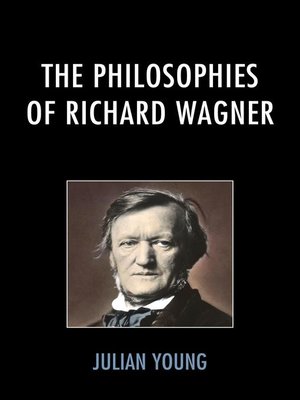
Sign up to save your library
With an OverDrive account, you can save your favorite libraries for at-a-glance information about availability. Find out more about OverDrive accounts.
Find this title in Libby, the library reading app by OverDrive.



Search for a digital library with this title
Title found at these libraries:
| Library Name | Distance |
|---|---|
| Loading... |
In addition to being a great composer, Richard Wagner was also an important philosopher. Julian Young begins by examining the philosophy of art and society Wagner constructs during his time as a revolutionary anarchist-communist. Modernity, Wagner argued, is to be rescued from its current anomie through the rebirth of Greek tragedy (the original Gesamtkunstwerk) in the form of the "artwork of the future," an artwork of which his own operas are the prototype.
Young then examines the entirely different philosophy Wagner constructs after his 1854 conversion from Hegelian optimism to Schopenhauerian pessimism. "Redemption" now becomes, not a future utopia in this world, but rather "transfigured" existence in another world, attainable only through death. Viewing Wagner's operas through the lens of his philosophy, the book offers often novel interpretations of Lohengrin, The Ring cycle, Tristan und Isolde, Die Meistersinger, and Parsifal.
Finally, Young dresses the cause of Friedrich Nietzsche's transformation from Wagner's intimate friend and disciple into his most savage critic. Nietzsche's fundamental accusation, it is argued, is one of betrayal: that Wagner betrayed his early, "life affirming" philosophy of art and life in favor of "life-denial." Nietzsche's assertion and the final conclusion of the book is that our task, now, is to "become better Wagnerians than Wagner."
Young then examines the entirely different philosophy Wagner constructs after his 1854 conversion from Hegelian optimism to Schopenhauerian pessimism. "Redemption" now becomes, not a future utopia in this world, but rather "transfigured" existence in another world, attainable only through death. Viewing Wagner's operas through the lens of his philosophy, the book offers often novel interpretations of Lohengrin, The Ring cycle, Tristan und Isolde, Die Meistersinger, and Parsifal.
Finally, Young dresses the cause of Friedrich Nietzsche's transformation from Wagner's intimate friend and disciple into his most savage critic. Nietzsche's fundamental accusation, it is argued, is one of betrayal: that Wagner betrayed his early, "life affirming" philosophy of art and life in favor of "life-denial." Nietzsche's assertion and the final conclusion of the book is that our task, now, is to "become better Wagnerians than Wagner."







